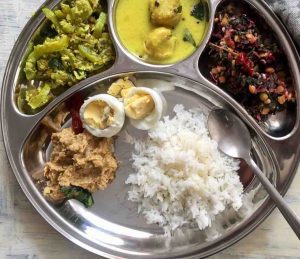The key is reducing carbs from the current level of 65-70% to 50%, and increasing the intake of protein and good fats.

Food for diabetics should consist of the right proportion of carbs, proteins and fat. (Creative Commons)
There is one problem with an Indian meal that, if corrected, can control diabetes.
A recent national study by ICMR-INDIAB has shown that if the carbohydrate content of the average Indian meal can be brought down, the protein upped, and fat maintained to certain percentages, the progression from pre-diabetes to diabetes can be slowed, and even a reversal of diabetes is possible.
The largest epidemiological study on diabetes done across 29 states and two Union territories has also found that the prevalence of diabetes in India is rapidly escalating.
It is estimated that there are nearly 7.4 crore diabetics and over eight crore pre-diabetic people in India.
Several studies have shown that the average Indian meal has excess carbohydrates (65-70 percent) — white rice in the southern and eastern parts, and refined wheat in the northern and western states — and very little protein. This contributes to increased risk of type 2 diabetes.
This study, using a mathematical model on 18,090 adults, showed that if the Indian diet is altered and the right percentage combination of carbs, protein, and fiber is added, diabetes can be reversed or stopped from progressing.
Prof @drmohanv sir at the ACCD 2022 hosted by @DrBMMakkar sir, presenting key learnings from the landmark, ICMR-INDIAB study. Changing prevalence, rising prediabetes, expanding waist circumference, dwindling physical activity……@banshisaboo @ManojCh00190740 @dramitaol @drpratikc pic.twitter.com/UnW3T2akyh
— Dr. Purvi Chawla (Each 1; Vaccinate 1) (@purvi_chawla) August 27, 2022
“>
The research paper suggests that, if the carbohydrate content of the Indian meal is brought down to 49-54 percent, the protein is increased to 19-20 percent, and fat maintained at around 21-26 percent, then reversal of diabetes can be achieved.
Meanwhile for the prevention of progression from pre-diabetes to diabetes, the carbs content should be in the 54-57 percent range, protein intake should be 16-20 percent, and fat at 20-24 percent.
Interestingly, while several research papers have suggested keeping carbs to almost nil to either lose weight or maintain diabetes, the researchers here debunk this.
First author of the study, Dr RM Anjana, vice-president, Madras Diabetes Research Foundation (MDRF), told South First: “Previous studies recommend a very low (near-zero) carbohydrate intake. This we found is unsustainable in the Indian context. Our results show that even a modest reduction in carbohydrate intake, an increase in protein and healthy fats, can help to both reverse diabetes as well as prevent its progression.”
Our article in Diabetes Care based on INDIAB with mathematical modelling on how to prevent diabetes and achieve Remission through dietary modification. https://t.co/qJ0fRlDNHY
— Dr.V.Mohan (@drmohanv) August 25, 2022
Meanwhile, Dr Seshadri Srinivasan, Kalasalingam Academy of Research, another researcher, told South First, “Using mathematical modelling, we were able to predict both remission and prevention of diabetes at a population level using the ICMR-INDIAB diet data.”
Interestingly, the doctors found that the study’s recommendations — though they varied slightly depending on the age, sex, body weight, activity level, and urban and rural set-ups — broadly applied across the board.

A balanced meal with carbs, proteins and fat is essential for diabetes reversal and management. (Supplied)
Meanwhile, Dr V Mohan, president, Madras Diabetes Research Foundation, told South First, “If Indians could even slightly change their dietary habits by decreasing their carbohydrate intake and substituting it with protein (preferably vegetable protein), not only diabetes, but even cardiovascular disease can be prevented.”
Dr Meghna Mevawala, a clinical and sports nutritionist, and a functional medicine expert, said that, in her practice, she sees a lot of youngsters coming in with a pre-diabetic condition.
“All of it is being attributed to refined food which is mostly carb without fibre added to it. Normally, after stopping refined foods and incorporating white foods with the right balance in carb fat and protein, we see a decrease in sugar readings within a month,” she told South First.
“As a thumb rule, diabetics should make sure each meal contains all three food types. So if we eat cereal, it must be accompanied by good fat as it prevents insulin spikes. For instance, If one is eating rice or chapatti, it should be had with small quantities of good fats like cow’s ghee or nut butters. And proteins should always be paired with fibre,” she said.

Apr 17, 2024

Mar 27, 2024

Mar 28, 2024

Mar 02, 2024

Mar 02, 2024